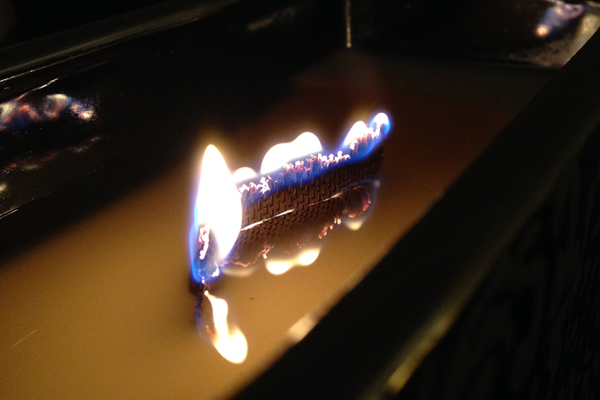
Coming up on the shortest day / longest night of the year last month, I happened across an article (which, of course, I failed to bookmark) about how the invention of the incandescent light changed our sleep patterns. It kind of blew my mind that I hadn’t even considered the impact of artificial lighting before. I’d read about how people in “the olden days” often referenced the “first sleep” and the “second sleep,” but I hadn’t thought very hard about what had caused that to change.
Then I thought about the few times we’ve had to deal with electricity being out. One summer evening in particular, I recall that I sat outside and read a book while the power was out. (This was at the old house, before Connor.) The power came back on in time for my bedtime routine, so I didn’t have to brush my teeth by candlelight or anything.
There was another time, a few years and one neighborhood before that, when the power went out one spring evening, forcing many of our neighbors outside for a pick-up game of b-ball while they grilled out for dinner.
Anyway, after remembering what it’s like being with no lights in the evening, my next thought was more of a challenge to myself: would I be able to change my daily routines to favor the rising and setting of the sun? Especially during the winter days, when the sun goes down by 5pm — what if I only had muted lights on after sundown? Or started burning candles again? What if we watched TV in the evenings in the dark, instead of with a lamp on? Would that help both me and Connor wind down for the night?
One family tried the experiment twice: once in June 2009, and again in February 2010.
[T]he June experiment with no artificial light was a huge success. Kia and I immediately started going to bed between 9 and 10 instead of around midnight. We quickly caught up on sleep, sleeping ten or eleven hours a night at first, then normalizing around eight hours. One thing we both noticed was a huge boost in mood — moments of unexplained, unreasonable joy would strike us at random times during the day.
…
Compared to June, February was a whole different ball game. Some days in June the sky was light until 9:30pm — in February we ended up lighting the candles as early as 5pm. I was concerned about not being able to get any work done, so we set 7:30pm as a cutoff for computers getting turned off.
…
After the experiment I see artificial light as something like sugar. We’re drawn to it, but too much is bad for us. In fact, it seems to be bad for us in many of the same ways — sleep deprivation reduces insulin sensitivity in the same way excessive sugar intake does.
For me, gone are the nights of having every light in the house blazing. The refrigerator light is back on, the bathroom light goes on when I’m in there, but otherwise it’s candles and maybe a mood light here and there. Even with this limited artificial light, the glow from my laptop is keeping me up later. Last night I slept from 11:45 to 6:15 — not bad but nothing like the solid eight hours I was getting most nights in February (one night I even slept eleven hours — I was tired and there was nothing preventing me from catching up).
Would I even be able to do it? How long until I would snap and just turn on all the lights in the house and say, to hell with this! I live in the future, not in the 1800’s! Or, conversely, how long until sundown would become even more of a sleep trigger for me than it already is? On weekends, my already-narrow window of weekend time with my night-shift husband would shrink to practically zero. I already turn into a pumpkin at 10pm, and am no good for anything by the time we get back from our monthly date night at 10:30pm. If I started winding down any earlier… I don’t know.
Really, it’s just an interesting thought experiment at this point. Living without artificial light is impractical for me and impossible for my husband, and I’m not convinced it’s something I’d want to try even if I didn’t have a preschooler to wrangle in the evenings.
Although perhaps laying off of the screen time right before bed might be a worthwhile start.